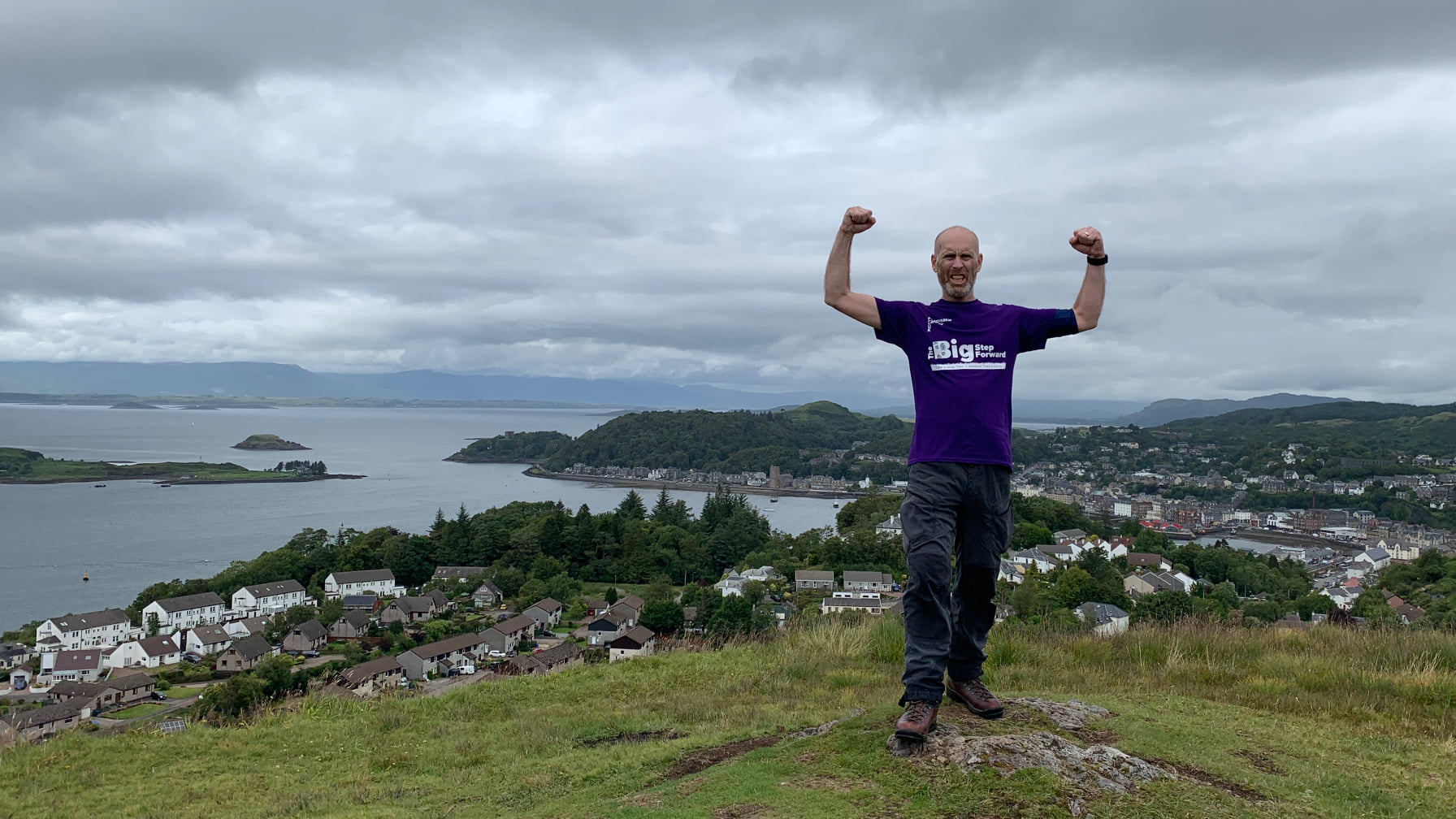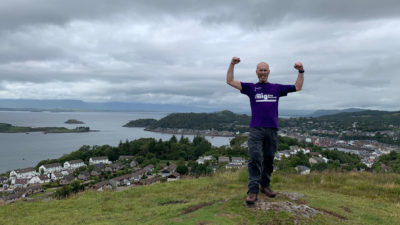

Adrian finds hope and positivity in fundraising, throughout his diagnosis and treatment.
Adrian was diagnosed with pancreatic cancer in May 2020, in the middle of the COVID-19 pandemic. After six gruelling rounds of chemotherapy, Adrian underwent an 11-hour operation to remove his pancreas and spleen and as a result became diabetic overnight, but with amazing support from his wife, his medical team and the Pancreatic Cancer UK nurses, he was able to rebuild his strength and stamina relatively quickly. Despite a round of mop up chemo – GemCap, he has recently had the news that his cancer has spread to his liver. He hopes to participate in a phase 1 chemotherapy trial being run at the Beatson Hospital in Glasgow.
While he was going through chemotherapy prior to his surgery, Adrian’s friend set up a 24-hour relay walk to raise funds for Pancreatic Cancer UK. There was an overwhelming amount of community support for the event and the team from Oban raised over £6,000.
Adrian tells his story, in his own words.
Diagnosis
I first noticed something was wrong in March 2020. I thought I was experiencing some acid reflux or indigestion, after exercising too soon after breakfast one morning. Despite being prescribed Gaviscon and then Lansoprazole for a few weeks, my symptoms progressively got worse.
On my birthday, I decided to enjoy a few beers, this seemed to really aggravate my digestive system. A week later I noticed my urine was a lot darker than normal and my wife noticed that I had a slight tint of yellow to my eyes and skin. A blood test at my local GP surgery confirmed I was jaundiced, so off to A&E I went. Following an ultrasound scan the next day, it was discovered my bile duct was not working properly. A CT scan the following day showed a mass on my pancreas. The Specialist Team in Glasgow Royal Infirmary then confirmed a 2.5 cm tumour pressing against my bile duct.
Always Look on the Bright Side of Life
The multidisciplinary team in Glasgow carried out an ERCP / EUS procedure and put a stent in the bile duct to solve the jaundice. During my stay in the Glasgow Royal Infirmary, I shared a ward with an amazingly humorous bunch of fellow patients who sang whole heartedly with me one evening, the song: ‘Always Look on the Bright Side of Life’ – much to the amusement of the Nurses. I’m still in contact with many of them now.
Stay Fit, stay Focused
As I was leaving the Glasgow Royal Infirmary, the doctor that carried out the ERCP / EUS looked me in the eye and said ‘Stay fit, stay focussed.’ That stuck with me. I think that’s good advice for anyone going through something like this. On the 29th May, the results from the biopsy confirmed that I had pancreatic cancer.
I started chemotherapy in the Oban Day Care Centre, whose staff were amazing. Each treatment consisted of a day having infusions and coming home with a slow release chemotherapy sphere over the course of 48 hours. The first cycle was very emotional with a day of sickness, diarrhoea and pains in my chest. After an overnight stay in hospital getting rehydrated, I felt much better and returned home.
Having served in the British Army for 24 years, I realise that this has given me an amazing amount of resilience and strength to cope with the tough journey I’m on.
Green Light
After six cycles of FOLFIRINOX chemo, a CT scan in Oban showed some suspicious lumps on my liver which had to be investigated before my surgery could go ahead. So following an MRI scan and a liver biopsy, I was thankfully and finally given the green light to go ahead for my operation.
I went back into the Glasgow Royal Infirmary on the 5th October, and spent 11 and half hours on the operating table. Unfortunately due to the size and position of the tumour, my whole pancreas and spleen had to be removed meaning I became diabetic overnight.
A steep learning curve
When I got home, it was a case of slowly increasing my exercise, diet and making sure I was having the right Creon dose and learning how to live as a type 3c diabetic.
The NHS here in Scotland has been fantastic and I have been very fortunate with receiving such a quick treatment plan despite the Covid-19 pandemic.
The Pancreatic Cancer UK nurses, one of which has become our regular contact, Rachel, have been utterly amazing in their support to myself and my wife, answering our many many questions. Their knowledge and expertise is endless. On the few occasions they were unable to answer a question, it wasn’t long before they came back to us with the answer.
By December 2020, I was feeling much better and getting stronger by the day. I had 3 rounds of mop-up GemCap chemotherapy starting on New Year’s Day. In March 2021 I celebrated the end of my chemo with the purchase of a new electric mountain bike which has enabled me to jump right back in to what I enjoy most – riding our local mountain trails with my sons. I’ve been feeling very much alive, fit and healthy.
Getting ready to face the next battle
Unfortunately, a recent MRI scan has confirmed that the pancreatic cancer had metastasised into my liver. This news has obviously devastated us. I have been put in touch with Professor Jeff Evans of the Beatson Hospital and I am hopefully going to participate in a Phase 1 clinical trial by mid May. I knew there was a risk of it coming back after surgery and chemotherapy, but I didn’t think it would be so soon. I am therefore in the process of picking myself up, staying positive, hopeful and getting ready to face this next battle.
The Big Step Forward (in July 2020)
My friend Finlo organised our 24-hour Big Step Forward walkathon. His mother passed away from pancreatic cancer in 2014, and he had registered for Pancreatic Cancer UK’s Big Step Forward. When I was diagnosed he said “Ok, let’s do some sort of 24 hour challenge.” And that’s how it started.
At first, we were just going to invite a small group of friends who were part of our beer-drinking WhatsApp group. But word slowly spread through the community with the event growing arms and legs resulting in 81 people taking part in the day – from a one-year-old in a backpack to a seventy-one-year-old ex British Army Colonel.
We set up a little WhatsApp group for people participating on the day, making sure we followed COVID rules and regulations by breaking the day up into hour slots, so people would be spread out. We had a four-mile loop and made sure that over those 24 hours there was always someone on the loop. I was just about well enough to participate on the day and do the walk too. I walked along the ridge-line and did a Facebook live post to the Big Step Forward event page. To be able to be there and be able to walk miles again felt amazing. It was really special to be able to participate with everyone else. It was a fantastic event with many people saying it was the social highlight of the year! It was just after lockdown had eased, so it was a great opportunity for people to catch up and socialise for the first time in months, which just added to the wonderful atmosphere of the day.
I have received so much help and support from Pancreatic Cancer UK, so it feels fantastic that we have been able to help them continue the wonderful work they do. We know that early detection helps improve the chances of surviving pancreatic cancer and knowing the money raised is going into funding that research, is just fantastic. The way everyone came together to do the walk and donate such a huge amount of money, especially when we only had a £500 target, was just a big lift to my spirits and positivity. It really helped my mental health and helped carry me on through chemo.
One of my current favourite adages is a quote from Anthony Horowitz: ‘It’s so much easier to cope if you decide to live in hope.’
If you would like to sign-up to join this year’s Big Step Forward on Saturday 17th July, simply go to thebigstepforward.org.uk to register. Registration is free, and we’ll send you a Welcome Pack and T-shirt to walk in.
We’ll walk physically apart but virtually together across the UK, to fund world-leading research and stamp out pancreatic cancer.
